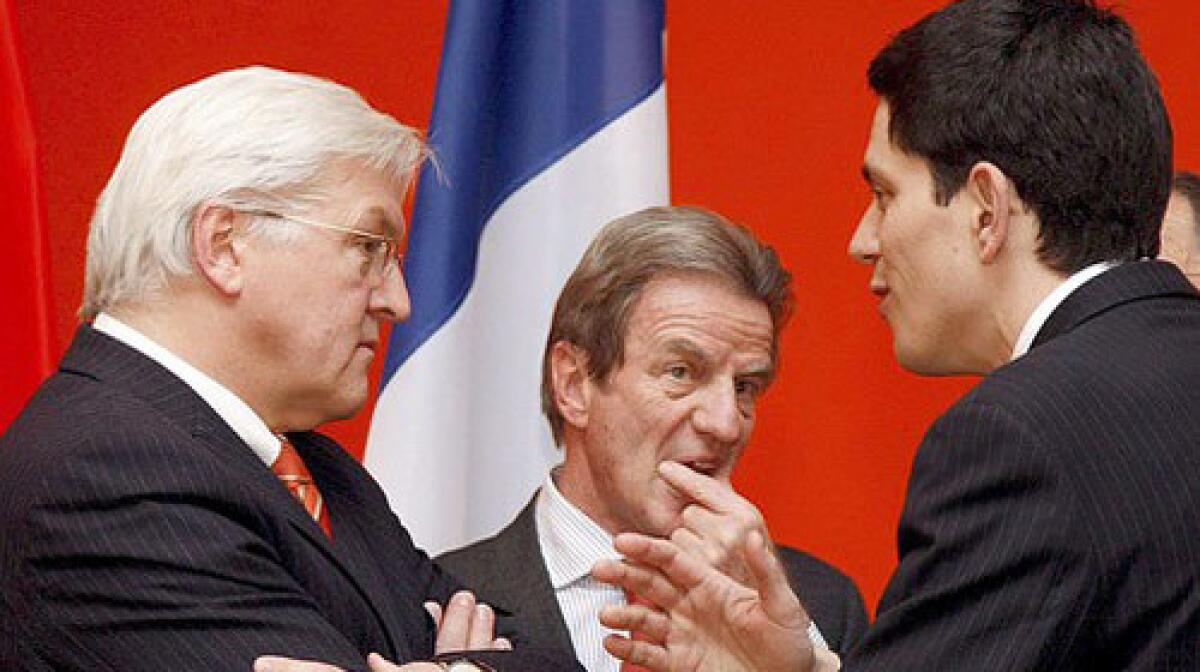Six-nation pact takes aim at Iran

- Share via
BERLIN — In a bid to ratchet up pressure on Iran to end its uranium enrichment program, six leading world powers agreed Tuesday to introduce a new United Nations resolution likely to tighten sanctions against the Islamic Republic.
Ending months of impasse with Russia and China, the agreement clears the way for the United States, Germany, France and Britain to submit a new resolution to the Security Council to increase political and economic constraints on Tehran. The hope is that sanctions might persuade Iran to abandon a uranium enrichment program that the U.S. and others say could be used to develop nuclear weapons.
The content of the resolution was not disclosed, but sources familiar with the negotiations said it probably would involve a mild increase in existing sanctions, including asset freezes, expansion of travel restrictions and visa bans targeting Iranian government officials and those connected to Tehran’s nuclear program.
“I thank my colleagues that we have found an agreement after an intense and not always easy discussion,” German Foreign Minister Frank-Walter Steinmeier said after a meeting he held here with his counterparts from the five permanent Security Council member nations. “We have agreed that we have to work to hinder Iran from getting a nuclear arms program.”
There was no immediate official reaction from Iran, which earlier in the day had dismissed the idea of new sanctions and said a stepped-up resolution would not force it to halt its nuclear program.
“The Iranian nation moves in the framework of its legitimate and legal rights . . . and a possible ratification of a new resolution will not have an impact on our nation’s behavior,” government spokesman Gholamhossein Elham said at a news conference before the agreement was announced, according to the semiofficial Fars News Agency.
Abulfazl Amoee, a political scientist close to Iranian President Mahmoud Ahmadinejad, said the new draft “will be baseless from the standpoint of international law” because of the U.S. National Intelligence Estimate last month that concluded Iran had halted its nuclear weapons program in 2003.
The estimate also says the Islamic Republic is unlikely to be able to make enough highly enriched uranium for a bomb before 2009 at the earliest, and possibly as late as 2015.
“On the whole, as we can see in the streets, common people will not pay attention to these sanctions, though perhaps investors or big importers or exporters may have second thoughts about doing business in Iran,” Amoee said in a telephone interview from Tehran.
If approved, the new resolution targeting Iran’s nuclear program would be the third adopted by the U.N. The last one, which took effect in 2006, imposed measures to halt the sale of equipment and technology for Tehran’s uranium enrichment, heavy water reactor and potential nuclear weapons delivery programs.
Mark Fitzpatrick, a senior nonproliferation expert at the International Institute for Strategic Studies in London, said it was clear going into Tuesday’s talks that they would not involve any significant economic sanctions, such as a halt in gasoline sales to Iran or a block on Iranian oil and gas exports, the only kind of measures that might be likely to produce an immediate and significant effect. Russia and China, and sometimes Western European countries, have opposed such measures.
Rather, Fitzpatrick said, the negotiations appeared to be focusing on expanding the number of people and organizations subject to travel and business bans. The U.S., he said, had hoped to add another Iranian bank to the list of entities blocked from international business relationships.
In Washington, analysts and foreign diplomats had expected any agreement to involve a weak resolution, with no drastic new sanctions. A senior European diplomat in Washington said last week that Russian and Chinese objections would limit the reach of a new sanctions resolution.
Western nations were willing to accept a weak resolution to show Iranians that world powers remain united, and to bolster calls for economic punishment by individual countries. U.S. officials hailed the agreement as a step that would further isolate Iran if its leaders refused to reconsider the nuclear enrichment program.
“They’re becoming increasingly isolated, and I think this shows that they aren’t able to divide us in our commitment to this effort,” State Department spokesman Gonzalo Gallegos said.
But many private analysts have been skeptical that such a resolution would persuade Tehran to suspend its enrichment program. A change is likely to come about, they say, only through a power shift in Iran. Parliamentary elections are set for March.
A British Foreign Ministry official, who spoke on condition of anonymity before the end of Tuesday’s meeting, said the goal of the Berlin talks was to form a “strong measure of agreement about the key elements that would form a part of any sanctions package” that would be formalized in U.N. negotiations in New York.
“We want a resolution. We think the time is right,” he said. “This isn’t going to go away, and we believe the sanctions that have been imposed so far have undoubtedly had some effect in at least promoting quite a lively debate amongst the Iranian political establishment about whether the hard-line policy promoted by Ahmadinejad is the right one for the Iranian people.”
Special correspondent Retzlaff reported from Berlin and Times staff writer Murphy from London. Special correspondent Ramin Mostaghim in Tehran and Times staff writer Paul Richter in Washington contributed to this report.
More to Read
Sign up for Essential California
The most important California stories and recommendations in your inbox every morning.
You may occasionally receive promotional content from the Los Angeles Times.













